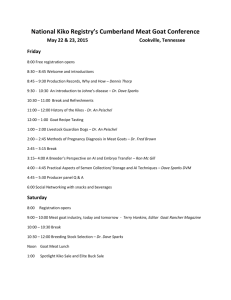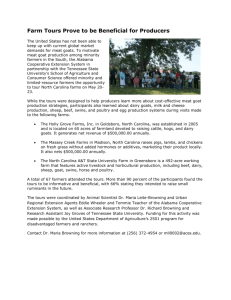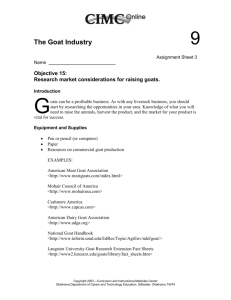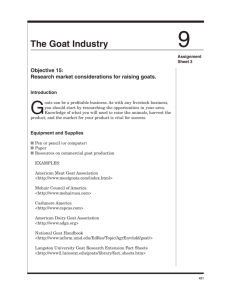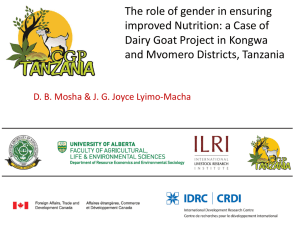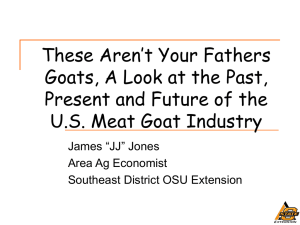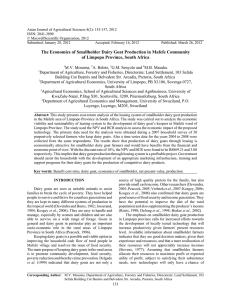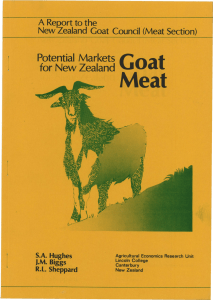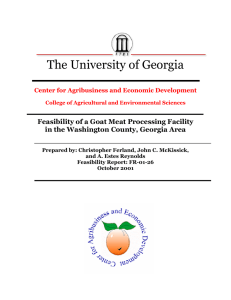Developing and Implementing a Plan for Marketing ______
advertisement
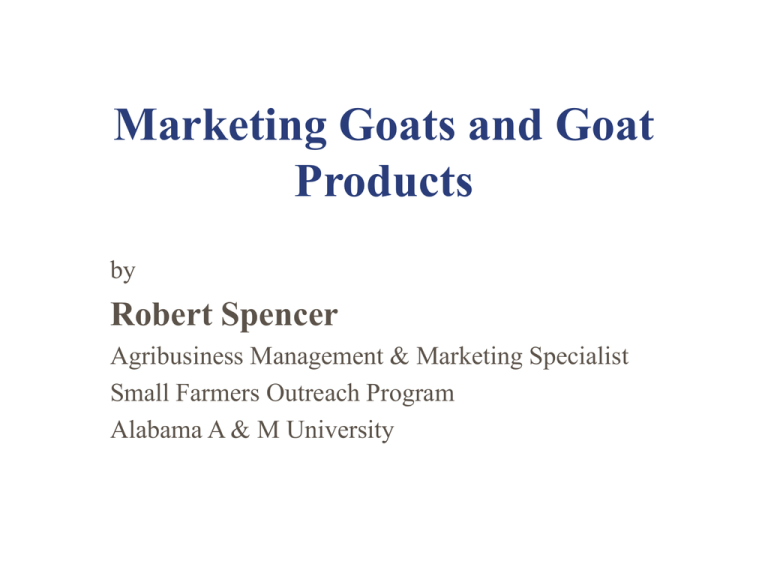
Marketing Goats and Goat Products by Robert Spencer Agribusiness Management & Marketing Specialist Small Farmers Outreach Program Alabama A & M University Statistics In 1977 there were 35,000 goats slaughtered in the U. S. By 1998 those numbers had risen to 450,000 U. S. producers are unable to meet the demand! Australia and New Zealand are the largest suppliers of goat meat to the U.S. Rules Have reasonable expectations. Research is essential. Learn from Mistakes # 1 Rule in Making Mistakes If you don’t make mistakes, you’re not trying hard enough! Think About It Goat farming is a relatively new enterprise in the U.S. It is not a trend like Emus and some other forms of alternative agriculture, the market is already established. Little research has been done on goats and marketing goats. Developing Specifics Dairy Goats? Breeder Market or Producer Market? Both? Identify markets? What size operation? Develop a Marketing plan Meat Goats? Breeder Market or Producer Market? Both? Identify markets? What size operation? Develop a Marketing Plan Dairy Goats Vs. Meat Goats Producer Market Dairy Goat Milk or Cheese? Must have a dairy license Start-up costs are high Other options Soap Start-up costs are minimal It’s fun Meat Goats Start-up cost are reasonable Demand established and continues to increase. Processed or Live? Processing facilities are far away Market Potential Meat Goats #1 meat consumed in the world Demand exceeds production Ethnic Demographics Market is not limited to large cities. Demand is year round Be Creative Organic Dairy Goat Milk Cheese Soap Ethnic Meat Goat Know Advantages of Products Value Added Live Whole Processed Know your Demographics Know How to meet their needs. Market Identification Identify and Cultivate Target Clientele Dairy Goat Dairy Lactose Intolerant Diabetic Ulcers Gourmet Consumers Fancy cheeses Fudge Soaps Skin Care Meat Goat Health Aspects Low Fat High in Nutrition Ethnic Populations Muslims Buddhists Hispanics Caribbean Africans Consumer Preferences Muslims, Middle Easterners, Buddhists, & Etc.. Often live or at least with heads on Younger goats, 6 months to a year old Hispanics Primarily live but will take processed Prefer younger goat but don’t mind older ones Consumer Preferences (cont) Caribbean Prefer older bucks with head on Goat Curry Goat head soup Africans Prefer Live Prefer older bucks (4 - 5 yrs.) Seasonal Demands Muslims & Etc. Hispanics Summer Caribbean October - Easter Fall - Winter Africans Anytime Consumers will buy anytime of the year because they enjoy Chevon or Cabrito. Production You raise the goats, sell them to a buyer, they process them, and it ends up in a meat market. You can expect anywhere from $.80 to $1.50 per pound. Simple and profits are marginal (Like most agricultural enterprises). Direct Marketing Direct marketing your product. The consumer comes to your farm You take the goat to a processor (USDA inspected) and the consumer picks it up when it is ready. Locate processing facility convenient for clientele (USDA or non-USDA). Direct Marketing should put more profits in your pocket. Keys to Enjoying the Goat Business Develop herd and health management plans Develop resources of information on goat health maintenance Develop a working relationship with more experienced goat farmers (for advice) Goats can be fun! Thank you for your time! Robert Spencer Agribusiness Management & Marketing Specialist Alabama A & M University E-mail: rspencer@aamu.edu Phone: (931) 937-7779 Mail: P.O. Box 58 Normal, AL 35762

